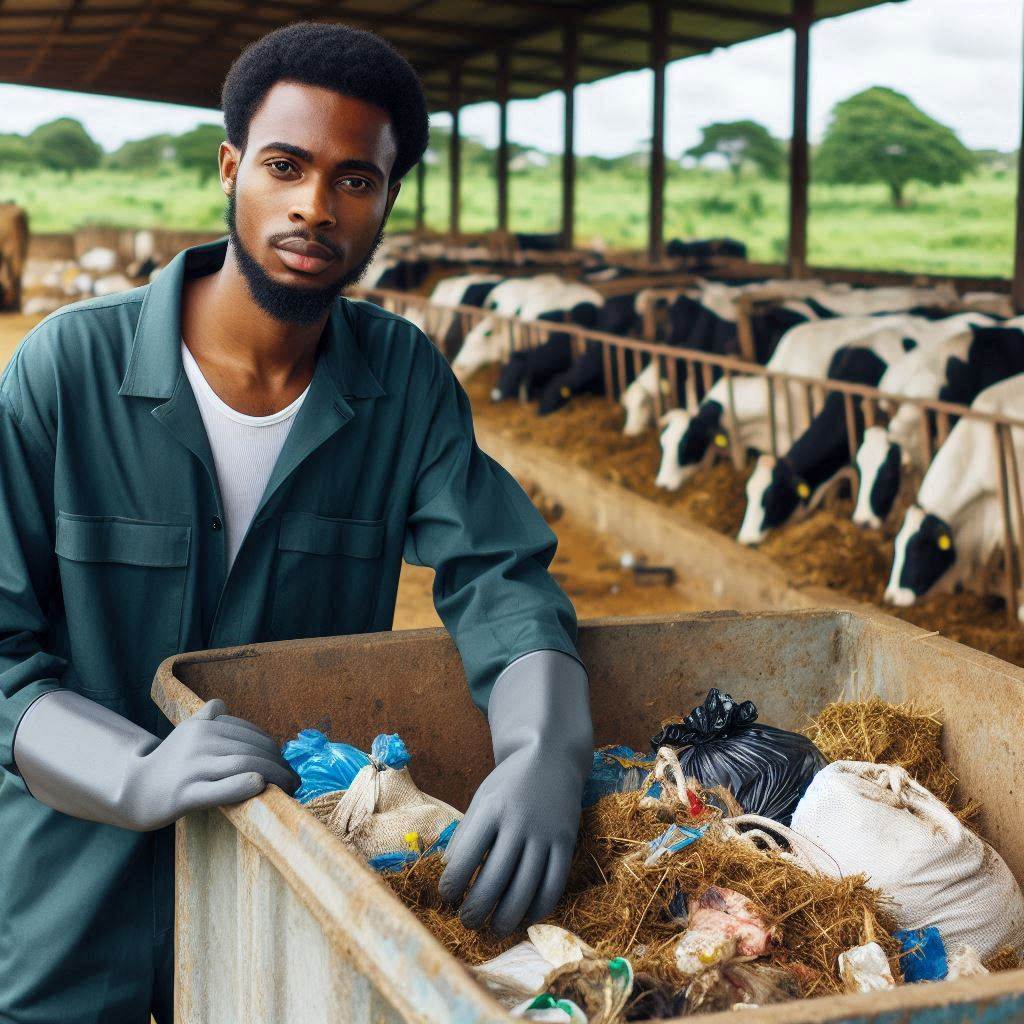Introduction
Adequate waste management is crucial for livestock farms to maintain environmental sustainability and profitability. Modern waste management practices not only benefit the environment by reducing pollution and greenhouse gas emissions but also help farms to improve efficiency and reduce costs.
Importance of Waste Management in Livestock Farms
Effective waste management is essential to prevent water and soil contamination, reduce odors, and minimize the risk of diseases. Proper handling of waste also ensures compliance with environmental regulations and public health standards.
Benefits of Modern Waste Management Practices
Implementing modern waste management practices such as composting, recycling, and biogas production can significantly reduce the environmental impact of livestock farming.
Composting organic waste can create nutrient-rich fertilizers for crops, while recycling materials like manure and bedding can save resources and reduce waste disposal costs.
Furthermore, biogas production from livestock waste can generate renewable energy for on-farm use or even be sold back to the grid. This not only reduces reliance on fossil fuels but also provides an additional revenue stream for the farm.
Basically, modern waste management practices in livestock farms play a critical role in promoting environmental sustainability, enhancing farm efficiency, and ensuring long-term profitability.
By adopting these practices, farms can minimize their ecological footprint and contribute to a healthier and more sustainable future for both the environment and the agricultural industry.
Types of Waste Produced in Livestock Farms
- Description of different types of waste produced, such as manure, feed waste, and bedding materials
- Discussion on the potential environmental impact of improper waste management practices
Manure
Manure is one of the most common types of waste produced in livestock farms. It is a combination of animal feces and urine along with any leftover feed.
Manure is rich in nutrients like nitrogen, phosphorus, and potassium, making it a valuable resource when properly managed. However, if not managed correctly, manure can leach into water sources and result in water pollution.
Feed Waste
Feed waste refers to any leftover feed that is not consumed by the animals. This can include hay, grains, or pellets that are either spilled or rejected by the animals.
Feed waste can attract pests and rodents if not cleaned up promptly, leading to potential health hazards for both the animals and farm workers. Additionally, decomposing feed waste can emit unpleasant odors and contribute to air pollution.
Bedding Materials
Bedding materials are used in livestock housing to provide comfort and absorb moisture. Common bedding materials include straw, sawdust, or wood shavings. As bedding materials absorb urine and feces, they become soiled and need to be regularly replaced.
Improper disposal of used bedding materials can lead to odors, contamination of nearby water sources, and breeding grounds for disease-causing organisms.
Environmental Impact of Improper Waste Management:
Improper waste management practices in livestock farms can have severe environmental consequences. When manure is not handled correctly, it can contribute to water pollution through nutrient runoff into streams and groundwater.
Excessive nutrients like nitrogen and phosphorus can lead to algal blooms, oxygen depletion, and harm aquatic life.
Additionally, decomposing feed waste and soiled bedding materials release methane, a potent greenhouse gas that contributes to climate change. Poorly managed waste can also attract flies, mosquitoes, and other pests that spread diseases to both animals and humans.
Odors emanating from piles of waste can reduce the quality of air in the surrounding areas, impacting the health and well-being of the community.
In summary, proper waste management practices are crucial for maintaining environmental sustainability in livestock farms.
By implementing strategies such as composting manure, minimizing feed waste through careful monitoring, and disposing of soiled bedding materials responsibly, farmers can reduce their environmental footprint and protect natural resources for future generations.
Read: Forestry and Climate Change: Nigeria’s Response and Education
Modern Waste Management Techniques
Composting
- Composting is a natural process of recycling organic material into a nutrient-rich soil amendment.
- It helps in reducing waste by converting manure and bedding materials into valuable compost.
- Composting also improves soil structure, increases nutrient retention, and promotes healthy plant growth.
Anaerobic Digestion
- Anaerobic digestion is a process that breaks down organic waste in the absence of oxygen.
- It helps in converting manure and other organic waste into biogas and nutrient-rich digestate.
- This technique not only reduces waste but also produces renewable energy in the form of biogas.
Vermiculture
- Vermiculture involves using earthworms to break down organic waste into nutrient-rich castings.
- It helps in reducing waste by converting manure and organic matter into valuable vermicompost.
- This technique also improves soil fertility, reduces odor, and enhances plant growth.
Benefits of Modern Waste Management Techniques
Waste Reduction
- Composting, anaerobic digestion, and vermiculture help in reducing the volume of waste generated on livestock farms.
- These techniques efficiently process organic waste into valuable products, minimizing the need for disposal.
Nutrient Recycling
- Modern waste management techniques allow for the recycling of nutrients present in organic waste.
- Composting, anaerobic digestion, and vermiculture convert waste into nutrient-rich products that can be used as fertilizers.
Odor Control
- Proper management of organic waste using modern techniques can help in controlling odor emissions.
- Composting, anaerobic digestion, and vermiculture break down waste in a controlled manner, reducing foul odors.
Therefore, implementing modern waste management techniques on livestock farms is essential for reducing waste, recycling nutrients, and controlling odors.
By adopting composting, anaerobic digestion, and vermiculture practices, farmers can achieve sustainable waste management while also benefiting the environment and their operations.
Read: Career Prospects in Forestry: Opportunities in Nigeria & Beyond
Challenges and Solutions
Challenges Faced in Implementing Modern Waste Management Practices in Livestock Farms
- Cost: One major challenge faced by livestock farms in implementing modern waste management practices is the high cost associated with setting up and maintaining these systems.
- Lack of Knowledge: Many livestock farmers lack the necessary knowledge and expertise to properly implement modern waste management practices on their farms.
- Resistance to Change: Some farmers may be resistant to change and may be reluctant to adopt new waste management practices due to traditional methods being ingrained in their farming practices.
- Environmental Regulations: Stricter environmental regulations and compliance guidelines may pose a challenge for livestock farms in implementing modern waste management practices.
Proposed Solutions to Overcome These Challenges
- Government Incentives: Governments can provide incentives such as subsidies, grants, and tax breaks to encourage livestock farmers to invest in modern waste management practices.
- Educational Programs: Providing educational programs and training sessions to farmers can help increase their knowledge and understanding of modern waste management practices.
- Collaboration with Industry Partners: Livestock farms can collaborate with industry partners and experts to receive guidance and support in implementing modern waste management practices.
- Technology Adoption: Investing in modern technologies such as biogas digesters, composting systems, and waste-to-energy solutions can help streamline waste management processes in livestock farms.
In general, while there are challenges in implementing modern waste management practices in livestock farms, there are also viable solutions available.
By addressing issues such as cost, lack of knowledge, and resistance to change, and by leveraging government incentives, educational programs, collaboration, and technology adoption, livestock farms can successfully implement effective waste management practices for a more sustainable and environmentally friendly operation.
Read: Scholarship and Funding Opportunities for Forestry Students in Nigeria

Case Studies
Anderson Farms
Anderson Farms, a large livestock farm in the Midwest, has successfully implemented modern waste management practices. They have invested in state-of-the-art composting systems and anaerobic digesters to manage their waste efficiently.
The results have been impressive. In the past year alone, Anderson Farms has seen a 20% increase in productivity. The compost produced from their waste management system has also improved soil quality, leading to healthier crops and higher yields.
Additionally, by reducing their waste output and implementing sustainable practices, Anderson Farms has minimized their environmental impact. They have received recognition from local environmental groups for their efforts in promoting sustainability in the farming industry.
Smith Family Ranch
Smith Family Ranch, a small livestock farm in the Pacific Northwest, has also embraced modern waste management strategies. They have implemented a system that separates solid waste for composting and utilizes liquid waste for fertilization.
The benefits of these practices have been significant for Smith Family Ranch. They have seen an increase in the health and well-being of their livestock, leading to higher quality meat and dairy products. This has translated into increased profitability for the farm.
Moreover, the use of liquid waste as fertilizer has improved soil health on the ranch, reducing the need for chemical fertilizers. This has not only saved costs for the farm but has also enhanced the sustainability of their operations for future generations.
Results and Benefits
- Increased productivity
- Improved soil quality
- Healthier crops and higher yields
- Minimized environmental impact
- Recognition for promoting sustainability
- Higher quality meat and dairy products
- Increased profitability
- Reduction in chemical fertilizer use
- Cost savings
- Enhanced sustainability for future generations
Read: Field Work & Practical Training in Nigerian Forestry Schools
Conclusion
In the realm of livestock farming, modern waste management practices stand as pillars of sustainable agricultural operations.
By embracing innovative techniques and technologies, farmers can address the challenges posed by waste production while maximizing the efficiency and productivity of their farms.
Through strategies like composting, anaerobic digestion, and nutrient management, farmers can effectively manage waste streams, turning what was once considered a liability into a valuable resource.
These approaches not only minimize environmental impact but also contribute to soil health and fertility, promoting long-term sustainability.
Moreover, modern waste management practices benefit not only the farm but also the surrounding ecosystems and communities.
By reducing pollution, minimizing odors, and preventing nutrient runoff, farmers can mitigate negative impacts on water quality and public health.
In essence, the adoption of modern waste management techniques represents a win-win scenario for farmers and the environment alike.
By prioritizing responsible waste management, livestock farms can thrive in harmony with nature, ensuring a brighter and more sustainable future for generations to come.




